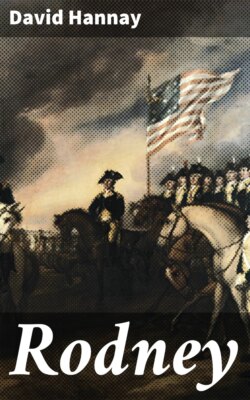Rodney

Реклама. ООО «ЛитРес», ИНН: 7719571260.
Оглавление
David Hannay. Rodney
Rodney
Table of Contents
CHAPTER I. FAMILY AND EARLY CAREER
CHAPTER II. SERVICE AS CAPTAIN TILL 1752
CHAPTER III. MARRIAGE, THE PRESS-GANG, AND THE FLAG
CHAPTER IV. FLAG RANK AND PARLIAMENT
CHAPTER V. SIXTEEN YEARS OF PEACE
CHAPTER VI. THE RELIEF OF GIBRALTAR
CHAPTER VII. THE WEST INDIES
CHAPTER VIII. THE CAMPAIGN OF 1780
CHAPTER IX. ST. EUSTATIUS
CHAPTER X. RODNEY’S STAY IN ENGLAND
CHAPTER XI. TO APRIL 12TH
CHAPTER XII. THE BREAKING OF THE LINE[A]
CHAPTER XIII. THE END
Отрывок из книги
David Hannay
Published by Good Press, 2021
.....
From 1743 to 1747 Rodney was engaged on mainly routine duties in the successive ships which he commanded—the Sheerness of twenty guns, the Ludlow Castle of forty, the Centurion of fifty, and the Eagle of sixty. He patrolled the North Sea in search of privateers, he protected convoys, he took soldiers to and from the Low Countries. In the Ludlow Castle he took a large privateer from St. Malo. In the Centurion he helped to patrol the coast of Scotland during the Forty-Five on the look-out for adventurers who might bring help to the Jacobites. When bringing the Centurion back from this service he had the ill-luck to run on the Whiting Sand off Orfordness, and lose thirty feet of his false keel and his rudder. The pilot was held very properly, no doubt, to be responsible, and Rodney passed without loss of credit to the command of the Eagle. The four years were useful to Rodney, no doubt; they gave him experience in the handling of a ship, and they showed his patrons that he was worth patronising. More need not, and indeed cannot, be said about them.
In 1747 the lazy naval war flamed up for a moment—just before it was ended by the uneasy truce called the Peace of Aix-la-Chapelle in 1748. France made a resolute effort both to help its forces in the East Indies, and to protect the return of its convoys from the West. England pulled herself together, and decided to defeat this intention. Early in spring two squadrons were despatched—a strong one under Anson, to look for the French on their way to the East Indies, and a small one under Commodore Fox, to look for the home-coming French West India convoy. Both were successful. Fortune, which was never tired of rewarding Anson for so magnificently supporting the honour of the English flag in the bad times when Vernon was failing at Carthagena and Mathews was wrangling with Lestock in the Mediterranean, threw the East India convoy in his way. He captured ten of them—thereby earning his peerage and a second sackful of prize-money. Rodney served in the subordinate squadron under Fox. His ship the Eagle was one of the six which this commodore had under him. To them also fortune was kind. In June, about a month after Anson’s victory, the English squadron fell in, off Cape Ortugal, with the West India convoy of one hundred and seventy sail of merchant ships, under the guard of four war-ships. Men-of-war and merchant ships scattered at the sight of them. The King’s ships got off, but Fox’s squadron had a day of easy and lucrative work in snapping up the merchant runaways, whereof they took forty-eight of 16,051 tons in all. As they were laden with West Indian produce, the day’s work must have been better than a year’s pay to at least every captain in the squadron.
.....